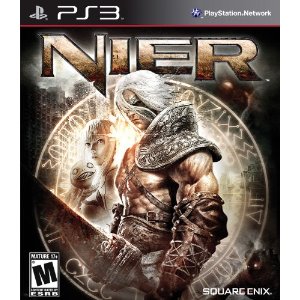
Nier is Square Enix’s latest efforts at producing a game that isn’t called Final Fantasy or Dragon Quest.
Two versions, Nier Gestalt and Nier Replicant, were announced in Japan for Xbox 360 and PlayStation 3 respectively. The lead character differs in age between the two games with North America gamers essentially getting the older man. Much of the game was left in speculation with few details unveiled up to the day of its release. Nier Gestalt, known solely as Nier, has now arrived on store shelves with much intrigue and mystery surrounding it.
Nier tells the tale of The Father, a caring but savagely ugly person, fighting to save himself and Yonah, his only daughter in an abandoned land. As one of the last surviving people on earth, he fights against the Shade, relentless monsters infesting the Earth, with the help of an ancient talking book, known as Grimoire Weiss. Yonah is struck by a terminal illness, sending the Father out to search for a cure whilst encountering the hot tempered Kaine, a woman possessed by a Shade who curses and swears like a sailor. The game begins as a hack and slash but transitions to RPG-type gameplay after several cutscenes and a small boss encounter.
The gameplay includes elements from both the RPG and action genre. Your character levels up in combat and has his fair share of puzzles to navigate through. Regrettably, the game gets tedious quickly with repetitive quests of fetching items and slaying monsters. Going to your next destination is easy as the radar points out exactly where you need to go with a giant red X. Treading back to the same person, room or building is tiresome and slows down the game’s pacing considerably. The large boss encounters is where Nier redeems itself as it gives you an ample challenge with mailboxes that serve as save points in the area.
When fighting a boss or hordes of enemies on screen, the camera is very inconsistent and can be quite the annoyance. Though you have the option to center the game angle, it will quickly revert back to a fixed angle that tracks your movements rather than giving you the appropriate view needed to fight a good battle. Failing a jump or falling from a high place incurs little penalty as the game brings you back to the nearest point with a health deduction. The game is very generous in dishing out medicinal herbs, dropped by monsters, to restore your health as you are constantly fighting Shades in every room or building. It does become a tad too predictable with combat falling on the easy side.
The Father himself is a fast runner but using the evasive move to dive and roll across the field is faster and more comical. Herbs and other items are easily found as they shine brightly in the tree shadows and bushes for you to dig up and find. Stronger weapons are usually dropped as spoils after the monsters are dead and equipping them is easy with the assigned D-pad. Later in the game, you can stealthy approach a boar and ride it across the field as an alternative to running or literally rolling around town. Much of the free movement in the game is akin to an MMORPG type of setting.
Visually, the environments are shockingly bland for a Square Enix game. Open fields, buildings, roads and rooms that you come across feel dull and uninspired. The biggest surprise is the display of two grey horizontal bars in the cutscenes. It gives you the impression that the game is scaled down and leaves you wondering why it is there in the first place. The music is appropriate but is largely forgettable in many areas that you frequently visit on your travels.
FINAL ASSESSMENT:
Nier is a game that tries too hard to do everything. The pacing of the game suffers from boring quests and wildly inconsistent gameplay. It switches gears often from being an RPG to an action title to a platformer all at once. In the time spent playing this, I really wanted to enjoy Nier as an intricate game but it suffers largely from an identity crisis. Those eager to try out this game should approach it cautiously as a rental title first.



